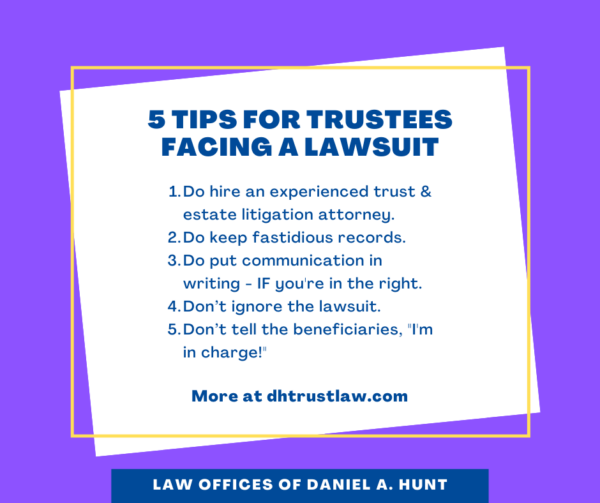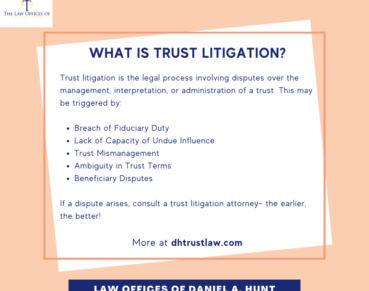5 Tips for Trustees Facing a Lawsuit

If you’re a trustee facing a lawsuit, you may be wondering what you should do next. Getting sued by a beneficiary is every trustee’s worst nightmare, but there is hope. While litigation is expensive and stressful, it probably isn’t the end of the world. Our law firm has defended countless trustees from lawsuits over the past decade. Here are 5 tips on what to do (and avoid doing) if you’re a trustee facing a lawsuit.
3 Things Trustees Facing a Lawsuit Should Do
1. Do hire an experienced trust & estate litigation attorney.
Did you know that most trust attorneys have little to no experience in litigated matters? Trust and estate litigation is a specialized niche. Just as you’d want to use the right tool to fix something that’s broken, a trustee facing a lawsuit should find the right attorney to help fix a problematic trust administration situation.
Some attorneys will offer a no-cost consultation to review your case details and any relevant documents you may have. We prepared an instructional video on how to prepare for a trust litigation consultation. One of the tips we share in that video was to always be transparent with your attorney about your past actions as the trustee.
If mistakes have been made, be open about them in your first consultation. We do not recommend lying to your attorney because when the truth comes out (and it will eventually), this revelation will inevitably weaken your position. We encourage you to be honest from day 1.
Consider using personal funds to pay the retainer when you hire your attorney. While it may be tempting to use trust assets to finance your legal representation, there’s a downside to this strategy. If you pay for representation with trust funds and later are removed as trustee, the new trustee will receive your file. Financing with personal funds preserves your attorney-client privilege and keeps your file confidential indefinitely. Financing litigation with trust funds will pass the attorney-client privilege to any newly appointed trustee.
2. Do keep fastidious records.
We’ve discussed elsewhere on our blog the critical nature of keeping accurate trustee records. If a beneficiary brings a lawsuit against you, this becomes even more imperative.
3. Do put communication in writing – if you are in the right.
The opposite is also true: don’t put communication in writing if you are in the wrong. Written communication as trustee can either vindicate or condemn you, depending on the nature of the contents. For example, if the communication reveals that you are breaching your fiduciary duties under the California Probate Code, it is not going to work in your favor. But as long as you are doing what you should be doing, written evidence provides support for your legal case.
2 Things Trustees Facing a Lawsuit Should Avoid
1. Don’t ignore the lawsuit.
When confronted with danger, all humans tend to react instinctively with one of two responses: fight or flight. You can either stay and fight a predator off or run away. For trustees facing a lawsuit, the “flight” instinct tends to mean that they bury their heads in the sand, ostrich-style, and try to ignore the legal action.
Hiding from a lawsuit to try to avoid conflict or consequences will probably not work. Instead, try a proactive approach that addresses the problem directly. A high-quality trust litigation attorney will fight off the attack for you so you can breathe again.
2. Don’t tell the beneficiaries, “I’m in charge!”
When threatened with a lawsuit, some trustees lean towards the instinct to fight off the attack. They may try to aggressively assert control or dominate the beneficiaries. Remember, the trust assets belong to the trust beneficiaries. You may have been appointed as the caretaker for these assets, but they’re not yours. Your powers as a trustee do have limits under the Probate Code and using them unwisely will hurt your case.
Bottom line: Don’t be a hothead. Stay humble and avoid unnecessary aggression. Let your attorney handle the fighting on your behalf.
Case Study: How We Defended a Trustee Facing Lawsuit
Our office has achieved favorable outcomes for many trustees who faced lawsuits over the years. One such client had been serving as successor trustee for their brother’s trust, which contained several million dollars. The beneficiaries of the trust were the successor trustee’s minor nieces and nephews.
This inexperienced trustee did his best to manage the assets but made a series of poor choices. Some bad loans and investments caused the trust to lose nearly $2 million over a 10-year period.
After a decade, several of the minor beneficiaries had become adults. They sued the trustee for the losses, many of which had occurred close to 10 years before. They sought damages for the entirety of the loss and a lien on the entirety of the trustee’s home. The beneficiaries argued that the trustee had failed to apprise them of the losses and was therefore personally liable for his poor investment choices and that the typical 3-year statute of limitations did not apply for the failure to make a proper disclosure.
The trustee, aware that his poor investments had resulted in the losses, was distraught at the idea of his own family becoming destitute because his own nieces and nephews were unwilling to consider a compromise without trial. He sought counsel from multiple previous attorneys.
Finally, only days before a court-scheduled Mandatory Settlement Conference prior to trial, the Trustee approached our office for help. In that small window of time, our litigation team discovered that while the trustee had made poor decisions at times, he had remained transparent over the years by providing the guardian of the beneficiaries with updates and reports by text and email.
Our office submitted a pleading to the court arguing that the statute of limitations did apply because the Probate Code provides:
(1) that an accounting or report sufficient to disclose a claim begins the statutory three-year period for contesting that account or report; and
(2) that a minor beneficiary is deemed to have received an account or report so long as a disinterested guardian or parent received the report.
That singular filing brought the minors to the negotiation table. The parties were able to reach a mutual agreement that saved the trustee from what could have been a multi-million dollar judgment against him, resulting in bankruptcy and potentially the loss of his home.
Our firm obtained a favorable outcome for that trustee and many others over the years. If you have questions about trust ligation or need defense against a lawsuit as a trustee, feel free to contact our office.
Law Offices of Daniel A. Hunt
The Law Offices of Daniel A. Hunt is a California law firm specializing in Estate Planning; Trust Administration & Litigation; Probate; and Conservatorships. We've helped over 10,000 clients find peace of mind. We serve clients throughout the greater Sacramento region and the state of California.




